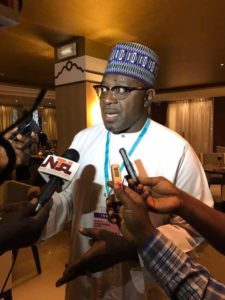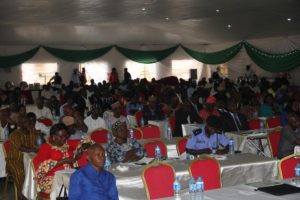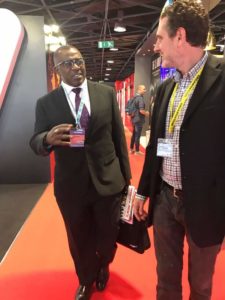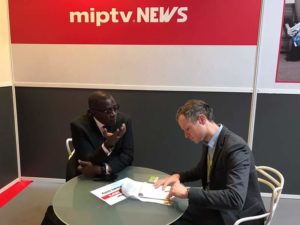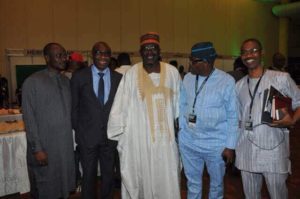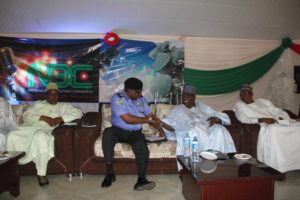
The Director General of the National Broadcasting Commission, NBC, Mallam Is’haq Modibbo Kawu has become synonymous with the digital revolution in Nigeria.
Undoubtedly, he has become the new face of the commission. With 40 years of uninterrupted media experience cutting across all genres, Kawu is deploying his boundless energy and passion to the digitisation efforts in Nigeria in order to change the narratives in the broadcasting industry.
The Editor, Time Nigeria Magazine, Abdul Rahman Aliagan captures the milestone covered by the commission within one eventful year under the watch of a man who has become the new sheriff for the once beleaguered industry.
Technological change has been identified as integral to the new media landscape, defining new grounds and opening new frontiers.
Instructively, this has set many nations of the world on their toes and progressively too in order to move with the trend of modern times and to be on the same page with the reality and global best practices in the broadcasting industry.
Research has insightfully shown that by year 2020, 75 per cent of businesses will be a digital or preparing to become one. It is believed that economy that fails to embrace digitisation may likely not survive.
In this, Nigeria’s National Broadcasting Commission, NBC in its definitive terms set the stage at changing the narrative in Nigeria’s broadcasting industry and ensuring that the new technologies offer immense opportunities and possibilities as established players adjust to a new environment.
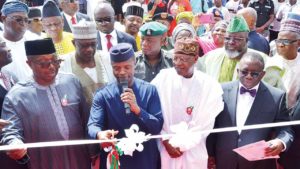
The Acting President, Prof. Yemi Osinbajo unveiled the commemorative plaque of the Pinnacle Broadcast Centre and Digital Switch On, DSO in the Federal Capital Territory, Abuja
With the emergent new technologies, it has become imperative to modernise and to come to terms with necessities and opportunities abound in the industry.
Of course, the pace and extent of adjustment to the new technologies differs among countries and players, particularly in the broadcasting industry. This is largely due to political will, influence and control in the respective countries.
For sure, Nigeria missed deadlines for Digital Switch Over (DSO) twice and this is largely owing to lack of political will on the part of previous governments to digitise Nigeria.
The Paradigm Shift
May 24, 2016 marked a new turning-point in the history of Nigeria’s broadcasting industry, as an astute administrator, ace broadcaster and a veteran journalist, Malam Is’haq Olanrewaju Modibbo Kawu took over the coveted position of the Director General of the National Broadcasting Commission, NBC, the Nigerian broadcasting regulatory agency.
His debut in the commission was premised on a clear-cut vision of taking Nigeria out of the shackles of the age-long Analogue system of broadcasting and to redirect latent energy abound in the nation’s broadcasting industry to drive socio-political and economic development.
Kawu in this task is well prepared; coming from a professional circle, equipped with abundant technical-know-how garnered from 40 years of uninterrupted experience cutting across all the genres of media engagements. To Kawu, the NBC became not only a place of choice but also where all arsenals of his professional ingenuity will be dissipated for the sole aim of placing Nigeria on the digital world-map with its multiplier effect on national development.
His priority is to redirect, refocus and chart a new course that will invent, create new innovations and ideas that are in line with modern trends that will affect the players very positively and the nation generally for the better.
The NBC boss is never tired of pointing out the uniqueness of Nigeria’s broadcast industry under his leadership, unlike what is happening in many other African countries where foreigners run the process. In Nigeria, it is Nigerian-designed, with Nigerians implementing and Nigerians running the country’s digital process. This is unique on the African continent!
Of this, he says: “I am totally committed to helping actualize President Muhammadu Buhari’s vision for a digital economy that works for Nigeria’s very creative community of young people working to create the content that will make the digital revolution a major highway of national development in Nigeria.
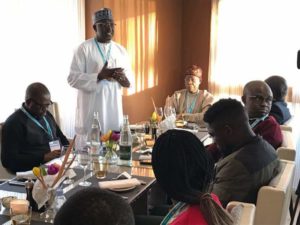
Nigerian Participants at MIPTV 2017 in Cannes, France led by Ninister of Information. Alhaji Lai Mohammed and DG, National Broadcasting Commission, Ishaq Modibbo Kawu, being hosted to a dinner where issues relating to local content were being discussed
“My role as the Director General of the National Broadcasting Commission (NBC) remains ensuring that the NBC continues to meet these constitutional objectives while abiding by the technological advancement of entering into the digital era.”
Restoring NBC’s Loss Credibility
Having travelled wide in the course of his chosen career, the DG of the broadcasting regulatory agency had certainly seen it all and is deploying this in precipitating the lofty global best practice experience.
It was not surprising that, on assumption of duty, he had hit the ground running by convening a management and staff meeting and one of the critical issues he raised was that of the credibility of NBC as a regulatory institution given the way and manner the commission was enmeshed in the electoral process during 2015 general elections. As a result, NBC was unable to play its role as a result of political interference. The NBC helmsman is ever ready to invoke the Nigerian Broadcasting Code to right the wrongs that have been the order of the day in the industry.
A man with a global view, Kawu is obsessed with what digital economy could offer Nigeria as a country and Nigerians as people. As a gatekeeper, Kawu is today saddled with the onerous responsibility of leading Nigeria through one of the most important phases in broadcasting development, the Digital Switch Over.
Affirmative Action on Nigeria’s Digitisation
With the launch of a pilot phase of digital switchover in Jos, Plateau, Nigeria commenced the Digital Switchover (DSO) in the Federal Capital Territory. President Muhammadu Buhari was represented at the event by Vice President, Prof. Yemi Osinbajo as a reflection of the importance of the process.
The NBC boss anchored a digital economy on two platforms, one as an opportunity to create job opportunities for Nigeria’s incredibly talented young people and as a national security issue that helps the young to feel a sense of belonging in the development process of Nigeria.
This feat was made possible with the full support of President Muhammadu Buhari who has largely driven the work NBC is doing with Nigeria’s DSO process. This is because he understands the importance of the process and has given it a massive endorsement through the financial support he gave the NBC and the public declaration he made through the vice president that Nigeria would ensure the completion of the Digital Switchover by June, 2017.
Kawu with an eye for innovation has set out to make NBC a technology-driven commission.
Today, NBC is driving a massive technological, logistics and a huge financial process in the broadcasting industry.
It is instructive to note that the Abuja Switch on certainly marked the definitive beginning of the journey to conclude a national Analogue Switch Off (ASO) and a Digital Switch Over (DSO). Following the Abuja DSO, Kawu made it known that about 251, 447 STBs were sold in Abuja while 145, 357 boxes were activated. NBC call centres received a total of 325, 028 calls in the same period.
Plans are at the top gear for the next phase for the six states in the geopolitical zones that NBC has decided to switch on. On this, Pinnacle Communications Limited has concluded an arrangement for the installation of the facilities for Kaduna.
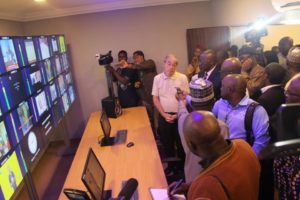
The DG, NBC, Mall. Is’haq Modibbo Kawu and the Management of the Commission , at the Pinnacle Monitoring and Transmission centre in Kaduna State on a facility visit to inspect the ultra modern digital equipment set up for the smooth take off of the Kaduna digital switch on.
Also concluded are plans for Delta and Gombe states, while the second signal distributor, ITS is replicating the same process in Kwara, Enugu and Osun states.
NBC has settled almost all indebtedness arising from the contracts awarded in respect of the DSO, effected payments to the Set Top Boxes manufacturers amounted to about N5billion. All these spirited steps were made to deepen NBC’s commitment to the entire process to achieve a nation-wide DSO.
Going with Stakeholders
At NBC, the era of impunity and flagrant disobedience to the finest ethos of broadcasting operation in Nigeria may have gone for good. This is not unconnected with the keen sense of patriotic responsibility the NBC boss brought to bear at the commission. Strict as ever, Kawu is all out to work strictly with the Code of Conduct that guides the operation of the industry without fear or favour.
Committed to order and due process, Kawu on assumption of duty called for a stakeholders’ meeting where his marshal plan of action was reeled out to the players in the industry. He equally sought their cooperation to achieve Digital Switch Over (DSO) in Nigeria and other issues that are germane to the smooth running of the industry. It \is instructive to note that a good number of issues that are central to the operations of the industry were also raised. It was expected that the decision taken at the meeting reflect the reality of time as well as assist in tackling the challenges facing the industry.
The Broadcast stakeholders’ meeting was well attended by the leading lights in the industry and among them was the Chairman, Broadcasting Organizations of Nigeria (BON), Mr John Momoh, Chairman Digiteam Nigeria, Engr. Edward Amana, State Commissioners of Information, State Permanent Secretaries in charge of Information, and 415 other participants made up of Broadcast Licensees, Broadcast Signal distributors, Set Top Box manufactures, Content aggregators, Content producers and other stakeholders.
At the meeting the DG, NBC laid before his audience the challenges before the commission and he sought their cooperated how to surmount them.
Among these challenges are financial, technical and logistics challenges militating against the DSO progress and other industry issues some of which are Digital Switch Over (DSO) and meeting the deadline of June 2017, strategizing to switch other states of the federation with a plan to switch six states simultaneously, heavy indebtedness to the NBC by station owners owing license fees of over N5billion, working out cost of carriage of content by the 2 signal distributors, streamlining the functions of key players in the DSO and resolving conflicts and setting Key Performance Indicators (KPI) to address areas of overlap in the DSO value-chain as well as illegal and rampant use of transmitting power by city based FM stations and resultant interference, indiscriminate importation of Transmitters not in tandem with the terms of license and absence of Aviation Warning lights on masts and the safety implications.
Momoh, at the meeting, expressed the concerns of broadcasters over declining revenue from adverts, the changing technology and the huge need for more quality content in the DSO. He enjoined Licensees to pay up all outstanding License fees.
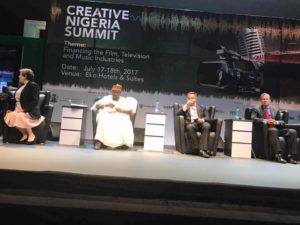
DG, NBC, Mall. Is’haq Modibbo Kawu, at the recently concluded Creative Nigeria Summit, held in Lagos, Nigeria
However, Amana, at the meeting gave an insightful overview of the DSO and the journey so far. He was optimistic that NBC will meet the DSO deadline of June, 2017. He said achieving Nigeria DSO largely depends on funding, synergy of stakeholders; the ability of the broadcast Signal distributors to cover 90% of designated areas, ability of STB manufactures to produce enough boxes to meet at least 90% of demand and support of state and local governments to make the STB affordable for their people.
Forging a Strategic Partnerships
Apart from bringing stakeholders in the industry together, NBC boss also moved to forge a strategic partnership within and outside the country at ensuring that Nigeria goes digital within the stipulated time.
So resolute in his mission, Kawu has visited the Regulatory Body for Communication and Broadcasting in England (OFCOM) the very year he assumed duty and plan is at the top gear level about the possibility of collaborating relationship with OFCOM. On the same mission, he attended a workshop in France while he visited another commission in Cane, France.
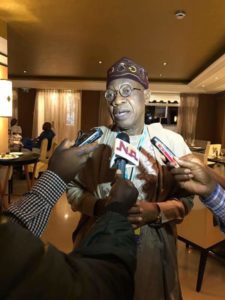
Minister of Information and Culture, Alhaji Lai Mohammed addressing Journalists at MIPTV Conference in Cannes, France
“We are trying to look at the best practices and see how we can learn from those practices to improve our own work here. I am trying to put together a visit by people from OFCOM to come and sit down with our people to look into the way we operate and we listen to suggestions so that we can improve our work. The institution itself must become a 21st Century institution so that we can then set benchmarks for the stations that we regulate and make sure that we do it in the best professional manner which is very vital,” he said.
Setting the Benchmark for Africa’s Broadcasting Industry
The NBC boss is of the strong conviction that Nigeria will set a benchmark for Africa Broadcasting Regulatory agencies, demonstrating the quality of professionalism that is embedded in him. Kawu was invited to deliver a paper at the International Summit on Content Management for Digital Broadcasting and Media on 24th and 25th January, 2017, at the Movenpick Ambassador Hotel, Accra, Ghana, where he spoke on The Content Publishing in the Digital Era: The Role of the Regulator.
In doing justice to the topic, he segmented his paper into four critical areas of broadcasting which are distribution, protection, monetisation and the role of regulator.
According to him, “Content publishing in the digital era is generally understood as the challenges for the print industry to transition to an internet based digital communication sector. But the concept of content encompasses, in addition to printed content, live or recorded content which is usually broadcast over the air through satellite, cable or terrestrial technology as well as over the internet and watched on all devices from television sets to computers, tablets and mobile phones.”
He described content as the central ingredient in broadcasting, adding that the major advantage of publishing content in the digital era is the availability of distribution platforms and making the maximization of the benefits of content more realizable.
Kawu pointed out that more platforms bring about more opportunities for profits with increased consumer opportunities, wider access and pluralism as well as more jobs for those involved in the creative and distribution structure.
On content protection, he noted that he digital superhighway is more competitive and intrusive; he advised that countries must establish strict rules for protection of local content and individual national heritage.
“In Nigeria’s DSO process, we have adopted 100 percent local content policy in that all the channels on our national Free TV platform are local. Similarly, a decision has also been taken to ensure that 70 percent of content on all the television stations in our multiplexes is local.
“This is to provide the platform for Nigerian talent and the bourgeoning of opportunities for the largest content creation pool on the African continent, to find the platforms of expression; as well as the creation of jobs right through the television value chain in our country,’’ he said.
Kawu, however, pointed out that in Africa; affordability remains a key issue as many cannot afford access to the technology.
He shared an experience of the technology acquisition in respect of Nigeria’s DSO process, how it was decided to create a national Set Top Boxes production system in Nigeria, how NBC licensed 13 manufacturers who have installed production lines at various stages and are committed to the employment of young Nigerians as well as the acquisition of the technology of Set Top Boxes productions and eventually, various add-ons, like television, tablets and handsets for mobile telephony.
Exposing broadcasting regulatory agency in Ghana to the way NBC technically avoided importation of Set Top Boxes, he said, “Our Set Up Boxes are fitted with middleware, security systems and so on in order to discourage the importation of boxes that would kill the nascent Set Top Boxes industry in Nigeria.
“Similarly, our Signal Distributors are mobilizing resources for the procurement of the huge numbers of digital transmitters that would be the backbone of the DSO in our country. The fact is that we are still working out how these huge investments could eventually bring decent returns on investment. The technology has been very expensive for us and that would certainly be the same in other African countries.”
The media expert however pointed out that media literacy and the knowledge or understanding of the Digital technology remains key issues. Many are yet to get acquainted with the Digital medium, its use and application.
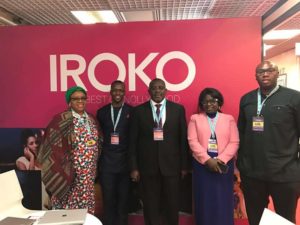
Mall. Is’haq Modibbo Kawu and his team at Content Management for Digital Broadcasting and Media Summit in Accra.
On the 15th November, 2016, Kawu was in Capetown in South Africa to deliver a paper at the 2016 TV Connect Africa (Africom). At the event, he gave an historical overview of the DSO project in Nigeria. He cited the political will of the Nigerian government and various stakeholders’ role in meeting the June 2017 target. He told his audience that this time around the DSO project is sacrosanct after many attempts fore his assumption of office.
Walking by the Code
NBC’s major duty is to ensure that people operate on the basis of Nigerian Broadcasting Code which literally is the Bible of the industry. Before now, the commission was enmeshed with what can be regarded as inordinate operations, where licence fees are not being paid, frequencies clashing, hate speeches, and above all, a situation where black-market approvals were gotten from the Villa to perpetrate illegal and unprofessional deals.
NBC under the new management had drawn a line, redefining NBC’s purpose in national growth and development. Today, NBC monitors on 24 hours basis stations around Nigeria, with 10 zonal offices and 24 state offices around Nigeria which file in reports on weekly basis.
Taking a grip of its mandate, NBC stops stations that run programmes or advert contrary to the Commission’s code of operations. Stations are fined, stations are warned and the final point is for NBC to take out erring stations. NBC does this on a permanent basis with cases directed to its Directorate of Investigation and Enforcement which investigates issues and enforces sanctions. NBC has a very elaborate structure of monitoring people and punishing stations on regular basis.
Consolidating his position to redefine NBC’s mandate, the Kawu-led management organised a retreat on May 15 and 17 to review Nigeria Broadcasting Code at Bristol Hotel, Kano. This was aimed at achieving a working document that will accommodate the developmental phases of broadcasting industry in the 21st century with particular reference to digitisation, taking into cognisance Nigeria’s democratic aspirations as well as concerns of critical stakeholders in the industry.
Of this, he said: “Our intention is to build a broad consensus around the Nigeria Broadcasting Code. We want to turn out a document that is fit for purpose in the broadcasting environment of the 21st Century, with its fast-paced developments, especially with the manner that new technologies are affecting how we carry out broadcasting, as well as offering remarkably new challenges for regulatory institutions, around the world.
“I hope the work that we are gathered to do at this retreat in the next few days, will help us concentrate minds about the challenges of the next phase of broadcasting’s evolution. We must have a Code that anticipates the challenges of the new era. Happily, in my view, we have brought to work with us individuals whose professional lives have very much been walked on the path of not only helping to create the Code, but helping to enforce its words.’’
In his goodwill message, Prof. Ibrahim Gambari, Chairman and Founder of the Savannah Centre for Diplomacy, Democracy and Development (SCDDD), who was represented by retired Col. Ademola Lawal, a Senior Analyst, Defence and Strategic Studies at Savannah Centre, thanked NBC for convening the very important retreat to review Nigeria’s Broadcasting Code.
Gambari maintained that it is only with clear policy and regulatory guidelines which address good ethics and professionalism in broadcast as well as halt dissemination of dangerous and hate speeches that cohesion and political stability could be achieved.
He said industry self-reforms and standardization will enhance good ethics and code of conduct for media and journalism practice in Nigeria.
The Chairman and Founder of SCDDD however pledged the cooperation of the Savannah Centre for NBC on this important national assignment for which NBC already took the lead.
License fees:
At a stakeholders’ conference with broadcast organizations, Kawu informed stations of a persistent pattern of refusal to pay license fees. He said stations around Nigeria owed the NBC over N5billion. The commission had spelt it out that it will work in accordance with the code of NBC. Broadcast stations will be made to work in accordance with the statutory act of informing NBC six months before expiration of licenses and signification of intention to continue as licensees.
Kawu reiterated at the meeting that with the new era at the commission, License fees are to be paid as at when due, adding that the pattern of gross indiscipline which many licensees had established in the past has to stop.
He also said the end has also come to those who use political power to get undue favour that runs contrary to the code of NBC. To him, this is an era of change and the business of the commission must be guided strictly by its code.
Licenses revocation
It is evident, that there is a new Sheriff at the NBC. On assumption of duty by the DG he gave directive that the licenses of 54 companies that were issued but had refused to pay their fees within the mandatory 60-day window be revoked. And those licenses were revoked! There is another list of over 120 licenses that were paid within the mandatory period but were unable to come on air, within the mandatory two years; they were also being processed for revocation. To him, frequencies cannot be held indefinitely by individuals!
Frequency interference
The fact that the broadcast operators deliberately ignore rules that guide their operations has resulted in frequencies clash all over Nigeria. This is one of the serious issues facing the commission prior to Kawu’s debut. For instance, city-based FM radio stations are permitted under the terms of their licenses to install 2KW transmitters to enable NBC to repeat frequencies in various cities around Nigeria.
It was surprising to note that stations go to purchase and install transmitters beyond the power that they were initially allocated. With this, NBC was faced with a pattern of illegality where stations purchase transmitters of between 10KW to 35KW without making any recourse to their statutory allotted frequencies.
With the new dispensation at NBC, such impunity and flagrant disobedience to the rule of law and the Code of Broadcasting in Nigeria will have no place.
The Commission has now given a six month notice to all broadcast stations involved in such an indecent act to revert to their statutory allocation.
According to the NBC boss, “Over 90 of such transmitters installed beyond capacity have been identified across Nigeria.”
NBC has also struck a collaborative deal with the Nigerian Customs Service for NBC to re-commence the process of pre-inspection of all imported transmitters into the country.
He maintained this was prevalent in the past; that way, NBC could control the importation of these transmitters.
“There is also a national security issue involved. There are mobile transmitters being imported by non-state, secessionist groups who are using these transmitters to broadcast anti-national propaganda as part of their effort to de-legitimize our country and propagate hate as well as secessionist propaganda,” Kawu said.
National Security and Hate speeches
Given the involvement of the commission in the 2015 electoral process which crippled it from performing its constitutional role as a broadcasting regulatory agency, the NBC has taken into cognisance the power of broadcast media as relating to national security. For this reason and living up to expectations, NBC takes major steps in ensuring that that in Nigeria’s broadcasting space no broadcast station involves in inciting comments that can threaten national security and endanger the good order in the country.
The NBC commissioned a Nigerian consultancy to do a study on its operation and hate speeches in Nigeria to help put in place a new element of Nigerian Broadcasting Code relating to hate speech.
One of the issues NBC has continued to harp on of recent is abuse of phone-in format of radio, as it is very easy to set up and so easy to abuse. According to the Commission, “People use that to allow all kinds of guests to come on air and profile the other person, other ethnic groups, other religions.
“All these fixed in to the crazy hate speeches syndrome. It must not be allowed in broadcasting to cause a major crisis in our country.”
Recalling the genocide crisis, Kawu said, ‘‘Radio played a major role in stoking the embassy and that reality should give all of us a pause in our country, on the African continent and the world. NBC is much alive to this reality and we are taking bold steps to assist the country.”
NBC is collaborating with the Centre for Diplomacy, Democracy and Development to incorporate the outcome in the review of the Nigeria Broadcasting Code. This will help broadcasters to strike a balance between freedoms of speech and hate speech.
Challenges
For every progressive development made in life, there are challenges. With DSO in Nigeria, there are problems already emerging even from the bouquet of programs in the offering in Nigeria’s DSO multiplexes. These include issues of content regulation, monitoring in the digital era, particularly in multicultural and multi-religious settings like Nigeria. The commission has technically divided offerings into local, regional and national contents to ensure smooth running of the new development.
The commission under the leadership of Kawu did not shy away from the technological deficit of his agency about monitoring multiple channels for quality and content as requested by the NBC Code.
As a professional to the core, Kawu is taking cognisance of the issues of cultural and moral sensitivities of the different communities of Nigeria. He ensured that the commission took a drastic step to analyse some of the contents being offered by some of the channels in Nigeria and the commission came to the conclusion that some contents would be unsuitable for certain sections of our country. NBC is very conscious to be actively involved in the compilation of the bouquet of programs that feed into various parts of country.




